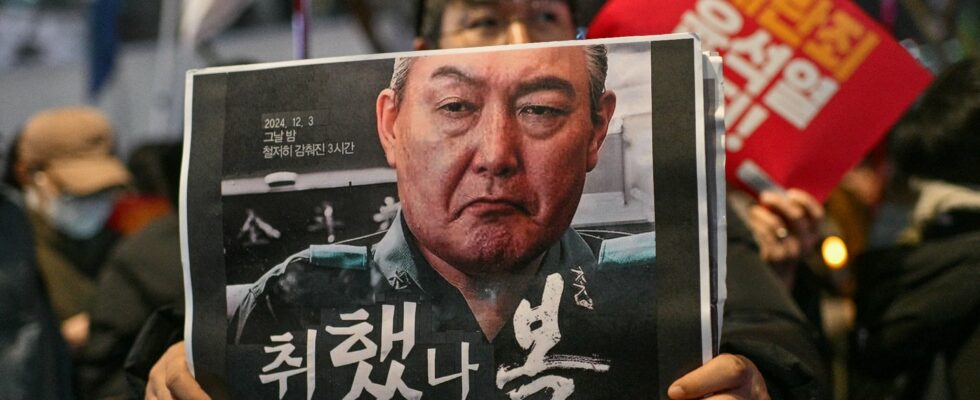This chronicle tells the little and big story behind our food, dishes or chefs. Powerful weapon soft power, A societal and cultural marker, food is the founding element of our civilizations. Conflicts, diplomacy, traditions, cuisine has always had a political dimension. Because, as Bossuet already said in the 17th century, “it is at the table that we govern”.
But what bug bit him? While the Korean Parliament did not validate, this Saturday, December 7, the dismissal of the conservative president elected in 2022, the triggering of martial law requested by Yoon Suk-yeol left many Western chancelleries speechless. The numerous scandals (the Dior handbag given to his wife, accusations of poll tampering) and a plummeting popularity are not enough to explain why the former attorney general of Korea awakened, for a few hours, the specter of dictatorship in this young liberal democracy. For Han Dong-hoon, the leader of his own party (PPP), there is now little doubt that this coup served as a pretext to arrest political opponents rather than to protect the homeland against an immediate North Korean threat. .
At present, it is still difficult to measure the repercussions of this slow poison that the Korean president has just injected. In addition to the political consequences, the markets have little taste for his latest blow. The agri-food sector, whose exports to Japan and China are growing strongly, already fears that the country’s image will be permanently tarnished. Some leaders of the instant noodle industry – very powerful in the region – and “K-Food” have already stepped up to sound the alarm in the Korean media.
The green onion becomes the emblem of the opposition
In the land of “Morning Calm”, we don’t joke with food. The slow authoritarian drift of Yoon Suk-yeol and the general discontent of the population strangely accelerated on March 18 in a fruit and vegetable store in Seoul. While his party is trying to regain control of Parliament in the legislative elections, the president goes to this business, under the eye of the cameras, to prove to everyone that prices are falling. He knows that the inflation argument can swing the vote. Inspecting a bunch of green onions, he launches into an argument: “I have visited many markets and 875 won [NDLR : 60 centimes d’euro] for that, it’s a reasonable price.” Except that the journalists will quickly discover the trick. In theory, this very popular ingredient in Korean cuisine costs three to four times more. The owner of the shop simply lowered its prices just before the visit of the Head of State…
The green onion will very quickly become the emblem of the opposition during campaign meetings. An avalanche of memes are flourishing on the Internet. Some even began posting photos of themselves holding up green onions at polling stations on social media, accompanied by hashtags such as #875wonsgreen. A movement so powerful that the National Electoral Commission was forced to ban this ingredient near polling stations so as not to disrupt the vote. Advertisements have even circulated on e-commerce sites for hyper-realistic headbands and key rings in the shape of green onions.
Omurice to revive relations with Japan
Yoon Suk-yeol, a gourmet and cooking enthusiast, has always loved solving crises around the table. In 2023, he is invited by Japanese Prime Minister Fumio Kishida to warm up ties undermined in recent years by historical disputes. The meeting with this neighbor is unprecedented at this level for 12 years. Objective ? Relaunch their diplomatic and commercial relations and present a united front against North Korea. To seal this rapprochement, the two leaders meet at Rengatei, the restaurant which is said to have invented the Korean president’s favorite dish: omurice.
This very simple family dish, composed of a creamy omelette which encompasses or overlooks fried rice generously topped with ketchup, was born in Japan through the importation and adaptation of Western recipes after the repeal of the sakoku [NDLR : restrictions commerciales aux puissances étrangères] at the beginning of the Meiji era, between 1868 and 1912. If today, it is adored by Korean children, it nevertheless remains a symbol of what the Japanese occupier was between 1910 and 1945.
In South Korea, the wounds of colonization are still far from being healed. In 2023, Yoon Suk-yeol accepted the idea of setting up a compensation mechanism for victims of forced labor, more than 780,000 people according to Seoul… but without the direct participation of Japan. An agreement described by the leader of the opposition as “the greatest humiliation in our history”, accusing the Korean president of lying down in front of the Japanese.
If the omurice shared with the head of the Japanese government is far from having resolved all the antagonisms, one measure will nevertheless remain to his credit. Yoon Suk-yeol passed a law at the beginning of 2024 aimed at banning within three years the trade in dog meat which had until now been an integral part of South Korean cuisine. An avowed animal lover, the president has adopted several stray dogs and cats with First Lady Kim Keon Hee, herself a vocal critic of the practice. Tory – that’s his name – therefore became the first dog to exchange his end of life in the slaughterhouse for a more peaceful existence at the Blue House, the presidential palace.
.
